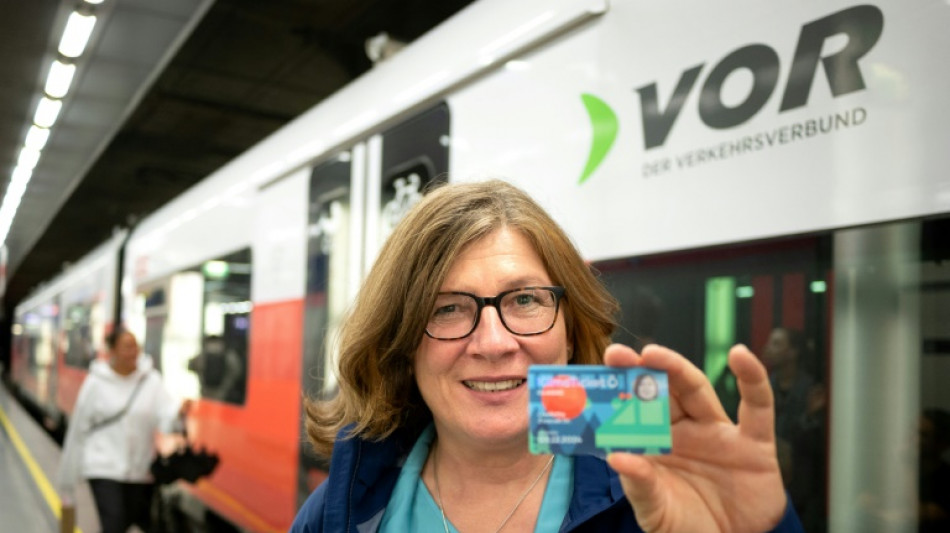
Austria Greens leave transport pass as legacy ahead of vote

Sunday's national vote in Austria is expected to punish the Greens, whose support has plunged since 2020 when they formed an unprecedented coalition with the conservatives.
But some of their popular initiatives will remain, including a pass that allows holders to take public transport throughout the country for 1,095 euros ($1,224) a year, or three euros per day.
"I just jump on the train and go, so that's really convenient," said Liselotte Zvacek, a 62-year-old consultant living near Vienna who uses the so-called "Klimaticket" to commute every day and to visit family.
Launched in 2021 with the objective of reaching 100,000 users, more than 300,000 people have the passes.
"That's more than I've ever dreamed of," outgoing environment minister Leonore Gewessler of the Greens told AFP, hailing "a real impact" to reduce CO2 emissions with Austrian trains running on renewable electricity.
- EU frontrunner -
Polls see the Greens getting just eight percent of votes in Sunday's poll, down from almost 14 percent during the last general elections in 2019.
Gewessler blames the "challenging times for government parties" with "really exceptional crises from the pandemic to the energy crisis to inflation" hitting Europe following Russia's invasion of Ukraine in 2022.
"Despite all of this, we've managed a lot in this country," she said, insisting "green policies work".
Greenhouse gas emissions linked to transport have fallen for two years in a row in a first in the Alpine nation of nine million people, where road traffic is a major source of pollution.
The Klimaticket initiative -- similar to the Swiss model -- made Austria "a frontrunner" in the EU because "everything is included," Gewessler said during the interview in her office at the ministry.
Neighbouring Germany followed suit last year, but high-speed trains are excluded, and the country's ageing and insufficient railway infrastructure is a far cry compared to that of Austria.
In a 2023 survey of 10,000 rail passengers, mobility organisation VCOe found 45 percent shifted rides from car to train, with the Klimaticket the second most important reason for these shifts.
In the same poll, 71 percent said they used rail services more often since they bought the pass.
Since July, those aged between 18 and 21 get one yearly pass for free.
- 'Special moment' -
Besides the environment ministry, the Greens also held other important portfolios, including health and justice, where they pushed to strengthen the independence of the public prosecutor's office.
But the Greens have had to make some real concessions governing with the conservatives who drive a hard line on immigration and other issues.
One of Gewessler's regrets is not having succeeded in reducing Austria's extreme dependence on Russian gas, even as Moscow's invasion of Ukraine stretches through its third year.
"Ultimately, we have to be honest, we are fuelling Russia's war budget," she said.
The coalition also survived corruption allegations causing the conservative chancellor at the time, Sebastian Kurz, to resign in 2021, as well as numerous other disagreements.
In June, Gewessler voted in favour of a milestone EU bill aimed at restoring degraded ecosystems in the 27-nation bloc, helping it pass, despite Chancellor Karl Nehammer's strong opposition.
His People's Party filed a criminal complaint against Gewessler claiming "abuse of office", but it has been dismissed.
"It was a very special moment," the former environmental activist said, deeming the bill "too important to let this opportunity slip".
Sunday's election will be "very decisive" for Austria, she said, with the far-right Freedom Party currently slightly ahead of the conservatives in what would be a historic victory.
"The decision that's on the ballot is whether the extreme right is in government with a backward-looking policy of really dividing society with more Russia instead of more independence, with really denying that climate crisis is actually here," she said.
V.Bennett--TNT